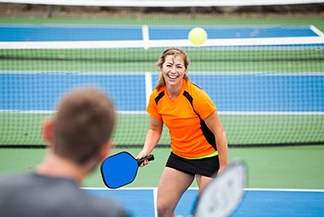Pickleball is a rapidly growing sport that has gained popularity in recent years. It is a sport that can be enjoyed by people of all ages and abilities, and can be played either competitively or recreationally. The popularity of pickleball can be attributed to several factors, including its relatively easy learning curve, the fun social aspect, and that is generally considered to be less injury-prone than other racquet sports. However, there are some common injuries that can occur:
- Shoulder injuries: Rotator cuff injuries and impingement syndrome can be caused by repetitive overhead motions or from a sudden injury such as a fall. These injuries can cause pain, weakness, and limited range of motion in the shoulder.
- Tennis elbow: Also known as lateral epicondylitis, this is a type of repetitive strain injury that affects the tendons in the forearm. It can cause pain and inflammation on the outside of the elbow and can be caused by overuse of the wrist and forearm muscles during pickleball.
- Wrist injuries: Wrist injuries can occur due to the repetitive motions involved in pickleball, such as hitting the ball or performing backhand shots. These injuries can cause pain, swelling, and difficulty using the wrist.
- Hip labrum tears: Injuries to the cartilage lining of the hip socket can occur with repetitive twisting and impingement motions of the hip. This can lead to symptoms of groin pain, clicking or locking, stiffness, instability, and weakness, especially when you are walking, running, or performing other activities that involve hip movement.
- Hamstring tendonitis and tears: Racket sports are a common cause of proximal hamstring tears, ranging from microscopic tears (tendonitis) to complete avulsion injuries of the tendons from the pelvis ischium. Tendonitis or partial tears can present with pain at the “sits bones” with seated activities, especially on hard surfaces and pain with hamstring activation such as stair climbing. A complete hamstring tear can lead to significant loss of power and function.
- Knee injuries: Knee injuries such as patellar tendinitis, meniscal tears, and even anterior cruciate ligament (ACL) tears can occur due to the quick stops and starts and turns involved in pickleball. Tendonitis injuries can cause a gradual onset of pain and swelling whereas a meniscus or ligament tear can cause immediate pain and swelling in the knee.
- Ankle sprains: Ankle sprains are a common injury in many sports, including pickleball. They occur when the ligaments that support the ankle are stretched or torn, causing pain, swelling, and difficulty walking.
- Achilles tendonitis/ruptures: Injuries to the Achilles tendon may result from repetitive activities such as running, pivoting, and jumping. More gradual onset of pain and even thickening of the tendon may be due to tendinosis. A rupture of the Achilles tendon may be associated with a pop and sudden pain.
- Lower back pain: The twisting and bending motions involved in pickleball can put strain on the lower back, leading to muscle strain or even herniated discs.
Here are some tips to help you avoid orthopedic injuries while playing pickleball:
- Warm-up: Before playing pickleball, it is important to warm-up your muscles and joints. You can do some light cardio exercises like jogging or jumping jacks, followed by some dynamic stretches to increase your range of motion and loosen up your joints.
- Wear appropriate shoes: Choose shoes that are designed for pickleball or other court sports. They should provide good support and cushioning for your feet and ankles.
- Use proper technique: Learning proper technique is key to avoiding orthopedic injuries. Make sure you have good form when hitting the ball and use your whole body, not just your arm, to generate power.
- Take breaks: Take regular breaks during your game to rest and hydrate. This will help prevent overuse injuries and reduce fatigue.
- Strengthen your muscles: Strengthening your muscles can help prevent injuries by providing more support to your joints. Focus on exercises that target the muscles used in pickleball, such as your legs, core, and upper body.
- Listen to your body: If you feel pain or discomfort, take a break and evaluate the situation. Continuing to play through pain can lead to more serious injuries.
- Cool down: After playing, cool down with some gentle stretches to help your muscles relax and prevent stiffness.
If your tendons, muscles, ligaments, or joints are feeling the heat of the kitchen, make an appointment with Dr. Hommen to get you on the right side of the court. An orthopedic surgeon can perform tests and imaging studies to diagnose and recommend appropriate treatment. To schedule an appointment with Dr. Hommen, call (305) 520-5625 or visit Dr. Hommen Online.













